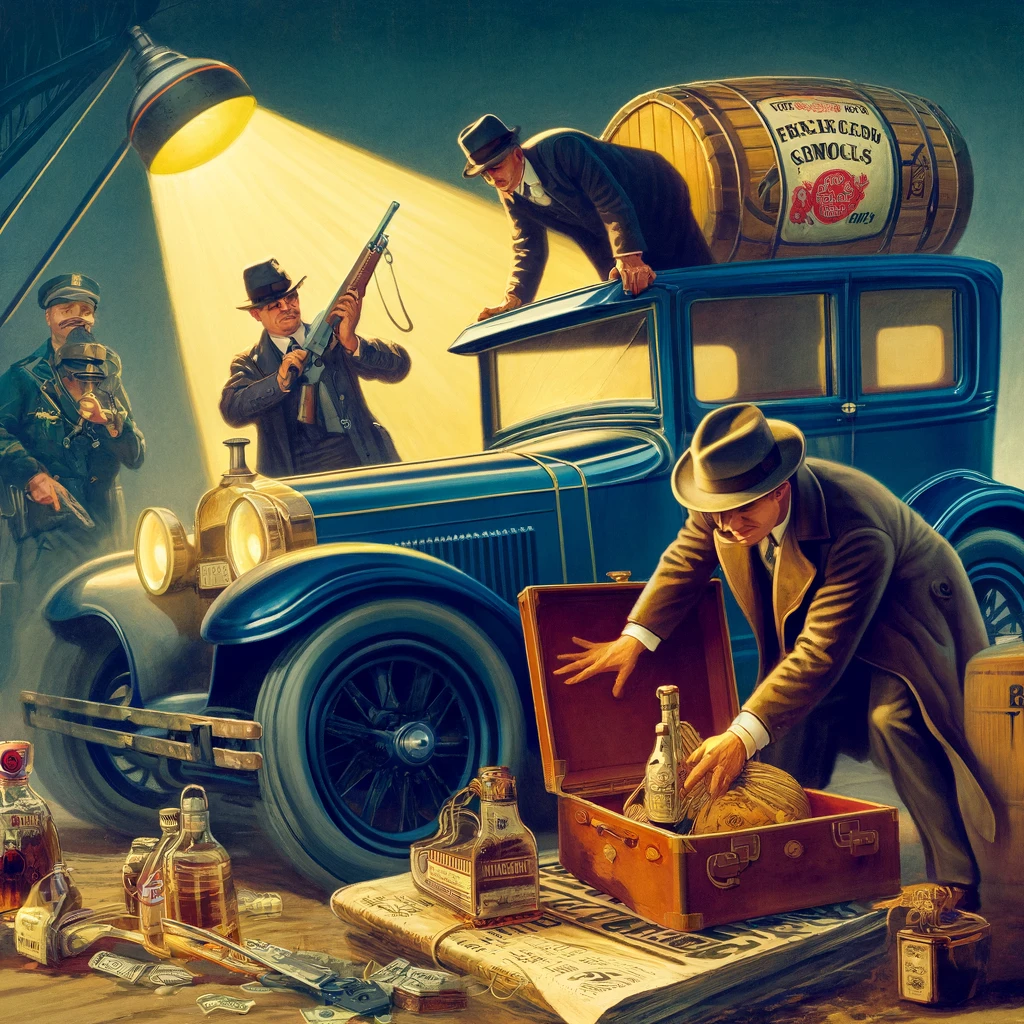Table of Contents
The Prohibition era in the United States, spanning from 1920 to 1933, is often remembered for its speakeasies, flappers, and, of course, the illicit manufacture and distribution of alcohol, known as moonshining and bootlegging. This period in American history was marked by a nationwide constitutional ban on the production, importation, transportation, and sale of alcoholic beverages, enacted under the 18th Amendment. But rather than curbing the consumption of alcohol, Prohibition gave rise to a vibrant, albeit illegal, underground industry. Let’s dive into the intriguing world of bootlegging and moonshining during this tumultuous time.

The Origins of Moonshine
Moonshine—typically a homemade, unaged whiskey—has roots that extend far before Prohibition. Early American settlers from Scotland and Ireland brought their knowledge of distilling with them, using it as a means to turn excess grain into a profitable and portable commodity. However, it was during Prohibition that moonshining saw a dramatic rise as individuals sought to meet the unrelenting demand for liquor. Hidden away in the rural parts of Appalachia, makeshift distilleries churned out gallons of this potent brew, far from the prying eyes of law enforcement.

The Art of Bootlegging
While moonshiners were busy distilling, bootleggers took on the risky business of distribution. Bootleggers were the daring individuals who transported illegal alcohol across state lines, delivering it to speakeasies and private clients. They employed a variety of inventive methods to evade detection, such as false compartments in vehicles, camouflaged boats, and secret routes. The era was characterized by a cat-and-mouse game between these bootleggers and federal agents, known colloquially as “revenuers”.
Notable Figures and Incidents
The prohibition era saw the rise of numerous colorful characters, including the infamous Al Capone, who made a fortune from his bootlegging empire in Chicago. But there were also lesser-known figures like Gertrude Lythgoe, dubbed the “Queen of the Bootleggers”, who was one of the few women in the trade and known for her savvy business acumen.
One of the most thrilling episodes of the era was the Whiskey Ring of the early 1920s, where a network of distillers and distributors conspired to defraud the federal government of taxes on the spirits they were illicitly selling. The scandal reached high into the ranks of government, underscoring the widespread corruption and the entanglement of politics with the bootlegging business.
Legacy and Cultural Impact
The Prohibition era significantly impacted American culture, giving rise to an era of jazz clubs, the speakeasy bar culture, and a certain romanticization of the rebellious spirit embodied by bootleggers and moonshiners. Even today, modern craft distilleries and popular media often draw on the lore and legacy of this period, with television shows like “Boardwalk Empire” and “Moonshiners” portraying the intrigue and danger of those times.
The Repeal of Prohibition: The Decline of Moonshining and Bootlegging
The Prohibition era came to an end with the ratification of the 21st Amendment in 1933, which repealed the 18th Amendment and restored the legal status of alcohol in the United States. This historic reversal was driven by widespread public discontent with Prohibition’s unintended consequences, such as the rampant rise in organized crime, corruption, and the dangerous unregulated production of alcohol. As legal avenues for alcohol production and sale reopened, the clandestine operations of moonshiners and bootleggers dwindled. While moonshining did not disappear entirely—remaining a cultural staple in some rural areas—it largely transitioned from a widespread illegal practice to a smaller-scale endeavor, often romanticized in American folklore and tradition. Meanwhile, the legacy of bootlegging influenced future regulations and policies regarding alcohol distribution and control, shaping the modern landscape of liquor laws in the United States.
Though Prohibition was intended to eradicate the consumption of alcohol in the United States, it ironically fostered a period of lawlessness and corruption. The stories of bootleggers and moonshiners from this era are testament to the ingenuity and resilience of the human spirit when faced with restrictive laws. Their legacy continues to influence the cultural and entrepreneurial landscape of America, reminding us of a time when the country went dry, but its people found their own ways to keep the spirits flowing.
How useful was this post?
Click on a star to rate it!
Average rating 5 / 5. Vote count: 2
No votes so far! Be the first to rate this post.
